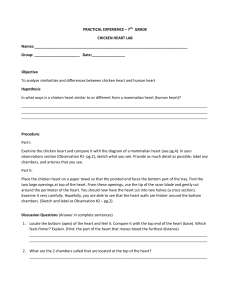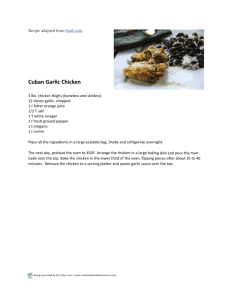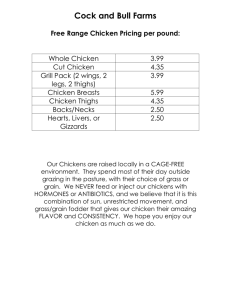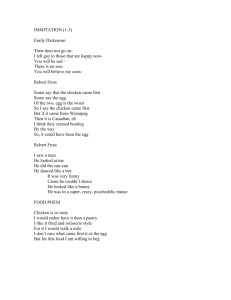JBHA 9 Chapter 30 – Human Body Systems LAB – Chicken Heart
advertisement
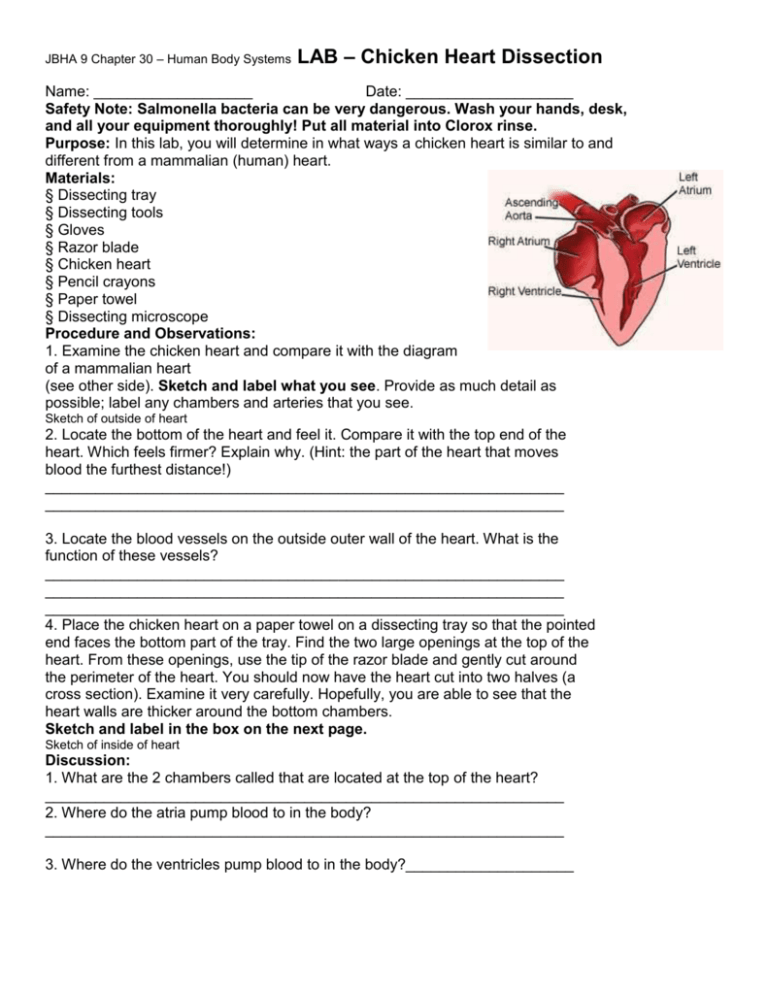
JBHA 9 Chapter 30 – Human Body Systems LAB – Chicken Heart Dissection Name: ___________________ Date: ____________________ Safety Note: Salmonella bacteria can be very dangerous. Wash your hands, desk, and all your equipment thoroughly! Put all material into Clorox rinse. Purpose: In this lab, you will determine in what ways a chicken heart is similar to and different from a mammalian (human) heart. Materials: § Dissecting tray § Dissecting tools § Gloves § Razor blade § Chicken heart § Pencil crayons § Paper towel § Dissecting microscope Procedure and Observations: 1. Examine the chicken heart and compare it with the diagram of a mammalian heart (see other side). Sketch and label what you see. Provide as much detail as possible; label any chambers and arteries that you see. Sketch of outside of heart 2. Locate the bottom of the heart and feel it. Compare it with the top end of the heart. Which feels firmer? Explain why. (Hint: the part of the heart that moves blood the furthest distance!) ______________________________________________________________ ______________________________________________________________ 3. Locate the blood vessels on the outside outer wall of the heart. What is the function of these vessels? ______________________________________________________________ ______________________________________________________________ ______________________________________________________________ 4. Place the chicken heart on a paper towel on a dissecting tray so that the pointed end faces the bottom part of the tray. Find the two large openings at the top of the heart. From these openings, use the tip of the razor blade and gently cut around the perimeter of the heart. You should now have the heart cut into two halves (a cross section). Examine it very carefully. Hopefully, you are able to see that the heart walls are thicker around the bottom chambers. Sketch and label in the box on the next page. Sketch of inside of heart Discussion: 1. What are the 2 chambers called that are located at the top of the heart? ______________________________________________________________ 2. Where do the atria pump blood to in the body? ______________________________________________________________ 3. Where do the ventricles pump blood to in the body?____________________ 4. Using your notes and your heart diagram, complete the following flow chart that lists the path of blood through the body. Body Cells Pulmonary Veins Vena Cava Pulmonary Arteries Aorta Lungs Chapter 30 – Human Body Systems Fill in the blanks and circle the correct words in the paragraphs below. A Chicken's Heart A Human's Heart Chicken heart Human heart Like the human heart, the chicken heart has (#) ____ chambers a right atrium and ventricle, which receives (oxygenated / deoxygenated) blood from the body and sends it to ______________ and a left atrium and ventricle, which receives (oxygenated / deoxygenated) blood from the lungs and sends it to _______________. Birds have a much higher metabolic rate than humans. The average body temperature of a chicken is 4145 degrees C, compared to a human's average body temperature of 37 o C. The pulse rate of a chicken can reach as high as 400 beats/min. All of these factors place a great demand on the chicken's heart, which has to work (more / less) than a human heart. The chicken's heart is adapted to handle the increased stress placed on it by its high metabolic rate. The size of the heart in relation to body mass is larger in birds (about 0.8%) than in mammals (about 0.6%). The inside walls of the __________ and ventricles are much smoother than those of the human. And the valves, though present, are much simpler. The smoother walls and simpler valves of the bird's heart reduces friction as the blood is pumped through; less friction means (more / less) work. The ventricles of the bird heart have (more / less) muscle mass and (more / less) chamber space than those of a human. Externally, the ventricles appear more slender and pointed than in a human heart.
